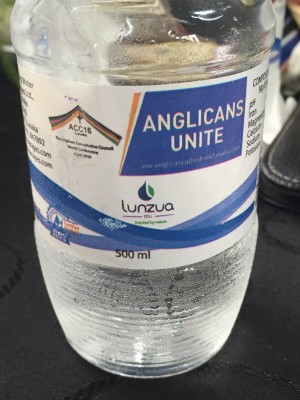
Lusaka, Zambia, April 8—The Standing Committee of the Anglican Consultative Council (ACC) made clear in a statement released today that it will not allow the leading archbishops of the communion to dictate the council’s response to the Episcopal Church’s decision to authorize rites that allow same-sex couples to marry in the church.
The primates of the Anglican Communion, meeting in Canterbury in January, had issued a communique that “required” a range of sanctions to be imposed on the Episcopal Church, including limits on its participation in the ACC. The standing committee rejected the authority of other Anglican leadership bodies—collectively referred to as the Instruments of Communion—to impose conditions on the ACC.
“The Standing Committee considered the Communiqué from the Primates and affirmed the relational links between the Instruments of Communion in which each Instrument, including the Anglican Consultative Council, forms its own views and has its own responsibilities,” the statement says.
The statement left open the question of how the council, which began a twelve-day meeting today, will respond to the sanctions that the primates gathering advocated against the Episcopal Church.
The Most Rev. Justin Welby, archbishop of Canterbury, who participated in the April 6-7 standing committee meeting, urged the ACC representatives gathered in the Cathedral of the Holy Cross to “work through the meaning of the consequences” advocated by the primates.
The primates’ communiqué “required” that “for a period of three years [the Episcopal Church] no longer represent us on ecumenical and interfaith bodies, should not be appointed or elected to an internal standing committee and that while participating in the internal bodies of the Anglican Communion, they will not take part in decision making on any issues pertaining to doctrine or polity.”
“I have acted on the areas of the communique that I have responsibility for,” said Welby to more than 70 representatives, youth delegates, and ecumenical participants. “It is both my and the primates’ hope and prayer that ACC will work through meaning of these consequences.”
In particular, Welby reported that he has appointed the task group recommended by the primates’ communiqué, saying that it included both laypeople and women. “Laypeople are the main bulwark and defense against unthinking clericalism,” he said.
Afterward, ACC vice chair Elizabeth Paver addressed the assembly. Paver, a laywoman from the Church of England who signed a letter of support for Bishop Jack Iker as he led the Diocese of Fort Worth out of the Episcopal Church in 2007, told delegates that the Archbishop of Canterbury “did pose a direct request from the primates to us.” While ruling out as divisive the possibility of an up-or-down vote, she said, “we would like in Christian love and friendship in our Anglican way just to be able to say to our archbishop and affirm our beliefs as a body to work together with our primates on these difficult issues. If that be your will, would you just affirm it in an applause; if it is not, don’t.”
Tentative applause followed, and the meeting was dismissed for a tea break.
Both the Rev. Gay Jennings, the Episcopal Church’s clergy representative to the ACC, and Rosalie Ballentine, the lay representative, noted that while Welby had specifically asked the ACC to consider the “consequences” advocated by the primates against the Episcopal Church, Paver had asked for applause as a sign of assent that the delegates would “work together with our primates on these difficult issues.”
“It was confusing because it was unclear what we were being asked to applaud,” said Jennings. “But what is clear are the warm welcome and greetings that the other Episcopal Church representatives and I have received from fellow delegates since our arrival in Lusaka.”
Welby, whose plea was framed as a meditation on the parable of the merchant who finds a pearl of great price (Matthew 13: 45-46), stressed what he termed the Anglican Communion’s “relational model of authority.” At the same time, he acknowledged that the primates meeting has no legal authority over provinces of the Anglican Communion and that no instrument of communion—the Primates’ Meeting, the Anglican Consultative Council, the Lambeth Conference, and the Archbishop of Canterbury—can bind another instrument.
“The primates sought to balance freedom, order, and human flourishing,” he said. “That balance anchors us in the breaking down of barriers, in facing each other. Out of this tension, Anglicanism emerged … Only when the balance is held can we see the pearl that is before us.”
Welby’s remarks were followed by a time for questions, during which the Most Rev. Daniel Deng Bul, primate of the Episcopal Church of Sudan and South Sudan, asked the ACC to follow the primates’ lead. “I personally feel that ACC has to support the initiative of the Archbishop of Canterbury that kept the primates together to keep the church of God together.”
Prior to the meeting, the primates of Nigeria, Uganda, Rwanda and Kenya had announced that their delegates would not attend the ACC meeting because the Episcopal Church’s delegates were planning to attend. The Most Rev. Mouneer Anis, the primate of the Episcopal Church in Jerusalem and the Middle East who is a member of the Standing Committee, also refused to attend. However, representatives from the Anglican Church of Kenya are attending the meeting.
In a press conference at the close of the meeting, the Rt. Rev. James Tengatenga, chair of the Standing Committee, said, “The Kenyans are here, and I don’t have a problem with that… Every member has a right, a responsibility, and a duty to attend, and all members from every province are expected to attend.”
The Most Rev. Josiah Idouw-Fearon, secretary of the Anglican Communion, confirmed that representatives of all provinces except Nigeria, Rwanda, and Uganda are in attendance at the meeting, which continues until April 19.